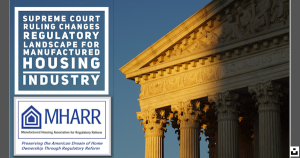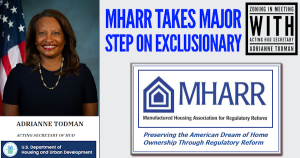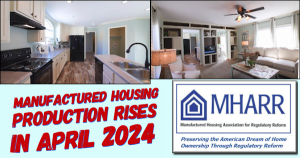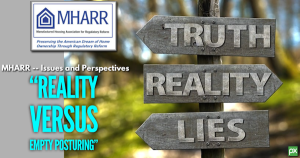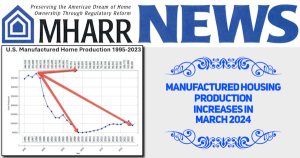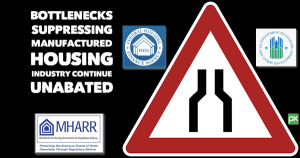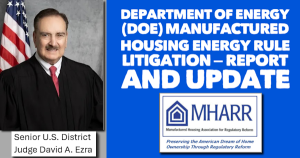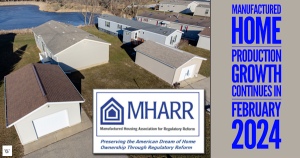“Where is the ‘Equity’ for Manufactured Homes and Consumers Of Affordable Housing?” – MHARR Issues and Perspectives
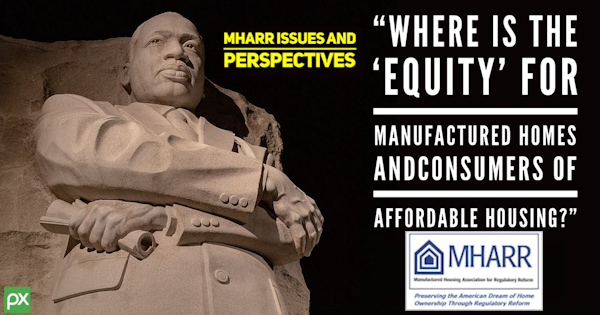
The Biden Administration, this month, marks its first full year in office. As one of his initial steps, President Biden announced that the concept of “equity” – economic equity and, most especially, racial equity – would be a bedrock foundation for his Administration’s policies and programs. In Executive Order 13985 (“Advancing Racial Equity and Support for Underserved Communities Through the Federal Government”), issued on January 20, 2021, “equity” is defined as “the consistent and systematic fair, just and impartial treatment of all individuals, including individuals who belong to underserved communities that have been denied such treatment … persons who live in rural areas; and persons otherwise adversely affected by persistent poverty or inequality.” (Emphasis added). That such “equity” principles, under the Biden Administration, can and do apply to all aspects of housing, is made clear by a follow-up presidential memorandum issued just days later, on January 26, 2021. That document states, in part: “racial inequality still permeates land-use patterns … and virtually all aspects of the housing markets.” (Emphasis added). As a result, the memorandum directs federal agencies to “eliminate racial bias and other forms of discrimination in all stages of home-buying and renting … and secure equal access to housing opportunity for all.” (Emphasis added).
A key issue for the HUD Code industry following a full year of the Biden Administration, then, is where do manufactured homes and manufactured housing consumers stand with respect to the concept of “equity” and the application of “equity” principles? The short and unacceptable answer (for now), is “nowhere.” Sadly, and despite two outstanding laws that should have ended structural discrimination against manufactured homes, manufactured homebuyers and manufactured homeowners years ago, the Administration’s “equity” policies have yet to be applied by federal agencies and Biden Administration officials within the manufactured housing market. The result is not only an absence of “equity” for those affected, but a continuing severe shortage in the supply and availability of affordable housing and, more specifically, affordable manufactured housing, accessible to Americans of “all” races at “all” income levels, in direct violation of President Biden’s stated policies and objectives.
How and where, then, do equity principles need to be applied to benefit Americans seeking (and needing) access to affordable manufactured housing that is comprehensively regulated by the federal government? As industry members and consumers of affordable housing are all too aware, despite modest signs of recovery, the manufactured housing market has been suppressed far below historic production levels for well over a decade and continues to lag behind the broader single-family housing market, which has seen substantial growth in recent years. As MHARR has repeatedly emphasized, the primary reasons for this utilization and growth gap between manufactured housing and other types of single-family housing, are both rooted in the continuing failure of the industry’s post-production sector. Those factors, as confirmed by a 2018 Urban Institute study authored by former HUD Principal Deputy Assistant Secretary Edward Golding and newly-installed Ginnie Mae President Alanna McCargo, are: (1) continuing and ongoing discrimination against manufactured housing consumers at the federal level with respect to home purchase financing; and (2) continuing and ongoing discrimination against manufactured housing homeowners with respect to zoning and home placement.
Interestingly, the conclusions of these housing experts — Mr. Golding and Ms. McCargo — correspond with, and (again) confirm, initial MHARR research and analysis for its upcoming White Paper seeking answers and solutions relating to the exploitation of federal housing funding and assistance for purely public relations purposes by ostensible representatives of the industry’s post-production sector. This White Paper will provide long-needed answers as to why so many federal housing programs which nominally include HUD Code manufactured housing by name, are rarely if ever funded and used to support and promote manufactured housing in the field. More on this, though, when the final White Paper is completed and published soon.
For present purposes, the factors cited by Mr. Golding and Ms. McCargo – actually, policy failures – have worked to exclude millions of lower and moderate-income Americans, including large minority populations, from not only the manufactured housing market, but from homeownership altogether, as mainstream manufactured housing continues to be the nation’s most affordable source of non-subsidized housing and home ownership. And while both of these matters fall squarely within the scope of President Biden’s “equity” agenda pertaining to housing and the housing markets, there has been, thus far, no meaningful improvement or change in direction regarding either at the federal level.
Focusing first on the application of equity principles within the manufactured home consumer financing market (zoning discrimination and equity will be addressed in a future column as well as in MHARR’s detailed White Paper), the failure to infuse equity considerations and policies within the implementation of the Duty to Serve Underserved Markets (DTS) provision of the Housing and Economic Recovery Act of 2008 (HERA) is a major policy failure that continues to harm minorities and lower-income populations within the manufactured housing market, as confirmed by the most recent data and analysis published by the Consumer Financial Protection Bureau (CFPB).
DTS, of course, directs Fannie Mae and Freddie Mac to provide securitization and a secondary market support for certain historically underserved markets, including HUD Code manufactured housing and the personal property/chattel loans which finance the vast bulk of manufactured housing purchases. If fully implemented on a market-significant basis, DTS would result in lower interest rates on manufactured home consumer loans. By securitizing and providing a secondary market for those loans, Fannie Mae and Freddie Mac would lower the degree of risk borne by loan originators and holders, and simultaneously draw new lenders into the manufactured housing consumer finance market. Lower risk coupled with increased competition would invariably lead to lower interest rates than are charged today. This, in itself, would result in a greater number of qualified and approved borrowers, a larger number of manufactured home loans actually made, and a greater number of manufactured homes sold and available to address the nation’s affordable housing crisis.
Conversely, in the absence of DTS-based market-significant securitization and secondary market support for manufactured housing consumer loans – and the absence of any DTS support whatsoever for the personal property loans that comprise nearly 80% of the manufactured housing purchase financing market – manufactured homebuyers in general and minority-group manufactured homebuyers in particular, are harmed in multiple ways as corroborated by CFPB data and analysis.
- First, the absence of broad securitization and secondary market support within the manufactured home consumer lending sector needlessly limits the number of lenders operating within that sector, rendering the entire sector less competitive with respect to interest rates than would be the case in a fully-competitive market.
This is confirmed by a May 2021 CFPB report specifically documenting the concentration of manufactured home consumer lending within a very small number of market-dominant lenders. The report thus notes that the two most dominant manufactured housing lenders, “21st Mortgage and Vanderbilt [Mortgage Corporation] … both subsidiaries of Clayton Homes,” control a “combined 30 percent of the manufactured housing market, including 56 percent of chattel lending….” (Emphasis added).
- Second, higher-than-necessary interest rates for manufactured home purchase loans in the absence of DTS support and a less-than-fully-competitive lending market, particularly within the personal property/chattel sector, needlessly exclude significant numbers of borrowers who might otherwise qualify for purchase financing if interest rates and corresponding monthly payments were lower.
This is again confirmed by the May 2021 CFPB report, which shows that only a small “minority (27 percent) of consumers who applied for a loan to buy a manufactured home succeeded in obtaining financing.” By contrast, “an estimated 42 percent of all manufactured home purchase applications were denied, including 50 percent of chattel applications….” (Emphasis added). This compares with a denial rate of “only 7 percent” for site-built home purchase loan applications.
- Third, such market exclusion and higher interest rates, particularly for HUD Code personal property loans, disproportionately impact and harm minority purchasers.
The May 2021 CFPB report specifically states that: “Hispanic white, Black and African American, and American Indian and Alaska Native borrowers make up larger shares of chattel loan borrowers than … among site-built loan borrowers” and that “Black and African American borrowers are … over-represented in chattel lending….” Combining this with the other datapoints and conclusions noted above, the CFPB analysis proves that African Americans and other minorities, under existing Fannie Mae and Freddie Mac policies concerning the implementation of DTS (as approved thus far by the Federal Housing Finance Agency-FHFA), are – and continue to be — disproportionately harmed.
Nor is this harm confined to the policies of FHFA, Fannie Mae and Freddie Mac with regard to private loans. In addition to DTS, federal law – i.e., the Title I Federal Housing Administration (FHA) manufactured home loan program — mandates federal government support for manufactured home personal property loans. Years ago, this program supported the origination of tens-of-thousands of manufactured home purchase loans – securitized by the Government National Mortgage Association (Ginnie Mae) – annually. In 2010, though, Ginnie Mae adopted its egregious “10-10” rule regarding qualifications for Title I lenders, and the bottom fell out of Title I originations which, today, are virtually non-existent. Effectively, then, there is no federal government support for manufactured home lending – either public or private – leaving potential homebuyers with virtually nowhere to go except the market-dominant higher-rate lenders, if they can qualify for any loan at all.
Ultimately, then, the failure of FHFA, Fannie Mae and Freddie Mac to implement DTS with respect to manufactured housing chattel loans, together with the parallel failure of FHA and Ginnie Mae to fully implement the Title I manufactured housing program, has allowed an economically-distorted, less-than-fully-competitive, systemically-discriminatory structure within the manufactured housing personal property lending market — with identifiable and quantifiable adverse impacts on racial minorities and other disadvantaged Americans — to remain in place, with no real effort, thus far, from the Biden Administration (assuming it is even aware of these issues due to the ongoing deficient representation of the post-production sector in Washington, D.C.) to remedy that failure through the application of equity principles and concepts.
There may be reason for hope going forward, given the recent elevation of Sandra Thompson and Alanna McCargo to serve as the Director of FHFA and President of Ginnie Mae respectively. MHARR has had – and continues to have — a positive dialogue with Ms. Thompson regarding the need for chattel loan DTS support. When Ms. Thompson served as FHFA Assistant Director, she spent a significant time meeting with MHARR and MHARR member manufacturers to understand the damage to the industry and consumers resulting from Fannie Mae and Freddie Mac’s failure to provide robust, market significant securitization and secondary market support under DTS for manufactured home consumer loans. And, as previously noted, Ms. McCargo is on record as acknowledging the destructive impact of financing discrimination on the availability of affordable, non-subsidized manufactured housing. Perhaps such leaders, with specific previous knowledge of the manufactured housing industry and effective pressure from the industry, can produce real change.
As the old saying goes, however, “hope” is not a strategy. The industry faces serious challenges within its post-production sector. Nothing will change, though, unless and until the industry decides that it is serious about change – and that ultimately means aggressive, independent national representation for the post-production sector in Washington, D.C. in order to correct these (and other) deficiencies that have harmed both the industry and American consumers of affordable housing
Mark Weiss
MHARR is a Washington, D.C.-based national trade association representing the views and interests of independent producers of federally-regulated manufactured housing.
“MHARR-Issues and Perspectives” is available for re-publication in full (i.e., without alteration or substantive modification) without further permission and with proper attribution to MHARR.
The Biden Administration, this month, marks its first full year in office. As one of his initial steps, President Biden announced that the concept of “equity” – economic equity and, most especially, racial equity – would be a bedrock foundation for his Administration’s policies and programs. In Executive Order 13985 (“Advancing Racial Equity and Support for Underserved Communities Through the Federal Government”), issued on January 20, 2021, “equity” is defined as “the consistent and systematic fair, just and impartial treatment of all individuals, including individuals who belong to underserved communities that have been denied such treatment … persons who live in rural areas; and persons otherwise adversely affected by persistent poverty or inequality.” (Emphasis added). That such “equity” principles, under the Biden Administration, can and do apply to all aspects of housing, is made clear by a follow-up presidential memorandum issued just days later, on January 26, 2021. That document states, in part: “racial inequality still permeates land-use patterns … and virtually all aspects of the housing markets.” (Emphasis added). As a result, the memorandum directs federal agencies to “eliminate racial bias and other forms of discrimination in all stages of home-buying and renting … and secure equal access to housing opportunity for all.” (Emphasis added).
A key issue for the HUD Code industry following a full year of the Biden Administration, then, is where do manufactured homes and manufactured housing consumers stand with respect to the concept of “equity” and the application of “equity” principles? The short and unacceptable answer (for now), is “nowhere.” Sadly, and despite two outstanding laws that should have ended structural discrimination against manufactured homes, manufactured homebuyers and manufactured homeowners years ago, the Administration’s “equity” policies have yet to be applied by federal agencies and Biden Administration officials within the manufactured housing market. The result is not only an absence of “equity” for those affected, but a continuing severe shortage in the supply and availability of affordable housing and, more specifically, affordable manufactured housing, accessible to Americans of “all” races at “all” income levels, in direct violation of President Biden’s stated policies and objectives.
How and where, then, do equity principles need to be applied to benefit Americans seeking (and needing) access to affordable manufactured housing that is comprehensively regulated by the federal government? As industry members and consumers of affordable housing are all too aware, despite modest signs of recovery, the manufactured housing market has been suppressed far below historic production levels for well over a decade and continues to lag behind the broader single-family housing market, which has seen substantial growth in recent years. As MHARR has repeatedly emphasized, the primary reasons for this utilization and growth gap between manufactured housing and other types of single-family housing, are both rooted in the continuing failure of the industry’s post-production sector. Those factors, as confirmed by a 2018 Urban Institute study authored by former HUD Principal Deputy Assistant Secretary Edward Golding and newly-installed Ginnie Mae President Alanna McCargo, are: (1) continuing and ongoing discrimination against manufactured housing consumers at the federal level with respect to home purchase financing; and (2) continuing and ongoing discrimination against manufactured housing homeowners with respect to zoning and home placement.
Interestingly, the conclusions of these housing experts — Mr. Golding and Ms. McCargo — correspond with, and (again) confirm, initial MHARR research and analysis for its upcoming White Paper seeking answers and solutions relating to the exploitation of federal housing funding and assistance for purely public relations purposes by ostensible representatives of the industry’s post-production sector. This White Paper will provide long-needed answers as to why so many federal housing programs which nominally include HUD Code manufactured housing by name, are rarely if ever funded and used to support and promote manufactured housing in the field. More on this, though, when the final White Paper is completed and published soon.
For present purposes, the factors cited by Mr. Golding and Ms. McCargo – actually, policy failures – have worked to exclude millions of lower and moderate-income Americans, including large minority populations, from not only the manufactured housing market, but from homeownership altogether, as mainstream manufactured housing continues to be the nation’s most affordable source of non-subsidized housing and home ownership. And while both of these matters fall squarely within the scope of President Biden’s “equity” agenda pertaining to housing and the housing markets, there has been, thus far, no meaningful improvement or change in direction regarding either at the federal level.
Focusing first on the application of equity principles within the manufactured home consumer financing market (zoning discrimination and equity will be addressed in a future column as well as in MHARR’s detailed White Paper), the failure to infuse equity considerations and policies within the implementation of the Duty to Serve Underserved Markets (DTS) provision of the Housing and Economic Recovery Act of 2008 (HERA) is a major policy failure that continues to harm minorities and lower-income populations within the manufactured housing market, as confirmed by the most recent data and analysis published by the Consumer Financial Protection Bureau (CFPB).
DTS, of course, directs Fannie Mae and Freddie Mac to provide securitization and a secondary market support for certain historically underserved markets, including HUD Code manufactured housing and the personal property/chattel loans which finance the vast bulk of manufactured housing purchases. If fully implemented on a market-significant basis, DTS would result in lower interest rates on manufactured home consumer loans. By securitizing and providing a secondary market for those loans, Fannie Mae and Freddie Mac would lower the degree of risk borne by loan originators and holders, and simultaneously draw new lenders into the manufactured housing consumer finance market. Lower risk coupled with increased competition would invariably lead to lower interest rates than are charged today. This, in itself, would result in a greater number of qualified and approved borrowers, a larger number of manufactured home loans actually made, and a greater number of manufactured homes sold and available to address the nation’s affordable housing crisis.
Conversely, in the absence of DTS-based market-significant securitization and secondary market support for manufactured housing consumer loans – and the absence of any DTS support whatsoever for the personal property loans that comprise nearly 80% of the manufactured housing purchase financing market – manufactured homebuyers in general and minority-group manufactured homebuyers in particular, are harmed in multiple ways as corroborated by CFPB data and analysis.
- First, the absence of broad securitization and secondary market support within the manufactured home consumer lending sector needlessly limits the number of lenders operating within that sector, rendering the entire sector less competitive with respect to interest rates than would be the case in a fully-competitive market.
This is confirmed by a May 2021 CFPB report specifically documenting the concentration of manufactured home consumer lending within a very small number of market-dominant lenders. The report thus notes that the two most dominant manufactured housing lenders, “21st Mortgage and Vanderbilt [Mortgage Corporation] … both subsidiaries of Clayton Homes,” control a “combined 30 percent of the manufactured housing market, including 56 percent of chattel lending….” (Emphasis added).
- Second, higher-than-necessary interest rates for manufactured home purchase loans in the absence of DTS support and a less-than-fully-competitive lending market, particularly within the personal property/chattel sector, needlessly exclude significant numbers of borrowers who might otherwise qualify for purchase financing if interest rates and corresponding monthly payments were lower.
This is again confirmed by the May 2021 CFPB report, which shows that only a small “minority (27 percent) of consumers who applied for a loan to buy a manufactured home succeeded in obtaining financing.” By contrast, “an estimated 42 percent of all manufactured home purchase applications were denied, including 50 percent of chattel applications….” (Emphasis added). This compares with a denial rate of “only 7 percent” for site-built home purchase loan applications.
- Third, such market exclusion and higher interest rates, particularly for HUD Code personal property loans, disproportionately impact and harm minority purchasers.
The May 2021 CFPB report specifically states that: “Hispanic white, Black and African American, and American Indian and Alaska Native borrowers make up larger shares of chattel loan borrowers than … among site-built loan borrowers” and that “Black and African American borrowers are … over-represented in chattel lending….” Combining this with the other datapoints and conclusions noted above, the CFPB analysis proves that African Americans and other minorities, under existing Fannie Mae and Freddie Mac policies concerning the implementation of DTS (as approved thus far by the Federal Housing Finance Agency-FHFA), are – and continue to be — disproportionately harmed.
Nor is this harm confined to the policies of FHFA, Fannie Mae and Freddie Mac with regard to private loans. In addition to DTS, federal law – i.e., the Title I Federal Housing Administration (FHA) manufactured home loan program — mandates federal government support for manufactured home personal property loans. Years ago, this program supported the origination of tens-of-thousands of manufactured home purchase loans – securitized by the Government National Mortgage Association (Ginnie Mae) – annually. In 2010, though, Ginnie Mae adopted its egregious “10-10” rule regarding qualifications for Title I lenders, and the bottom fell out of Title I originations which, today, are virtually non-existent. Effectively, then, there is no federal government support for manufactured home lending – either public or private – leaving potential homebuyers with virtually nowhere to go except the market-dominant higher-rate lenders, if they can qualify for any loan at all.
Ultimately, then, the failure of FHFA, Fannie Mae and Freddie Mac to implement DTS with respect to manufactured housing chattel loans, together with the parallel failure of FHA and Ginnie Mae to fully implement the Title I manufactured housing program, has allowed an economically-distorted, less-than-fully-competitive, systemically-discriminatory structure within the manufactured housing personal property lending market — with identifiable and quantifiable adverse impacts on racial minorities and other disadvantaged Americans — to remain in place, with no real effort, thus far, from the Biden Administration (assuming it is even aware of these issues due to the ongoing deficient representation of the post-production sector in Washington, D.C.) to remedy that failure through the application of equity principles and concepts.
There may be reason for hope going forward, given the recent elevation of Sandra Thompson and Alanna McCargo to serve as the Director of FHFA and President of Ginnie Mae respectively. MHARR has had – and continues to have — a positive dialogue with Ms. Thompson regarding the need for chattel loan DTS support. When Ms. Thompson served as FHFA Assistant Director, she spent a significant time meeting with MHARR and MHARR member manufacturers to understand the damage to the industry and consumers resulting from Fannie Mae and Freddie Mac’s failure to provide robust, market significant securitization and secondary market support under DTS for manufactured home consumer loans. And, as previously noted, Ms. McCargo is on record as acknowledging the destructive impact of financing discrimination on the availability of affordable, non-subsidized manufactured housing. Perhaps such leaders, with specific previous knowledge of the manufactured housing industry and effective pressure from the industry, can produce real change.
As the old saying goes, however, “hope” is not a strategy. The industry faces serious challenges within its post-production sector. Nothing will change, though, unless and until the industry decides that it is serious about change – and that ultimately means aggressive, independent national representation for the post-production sector in Washington, D.C. in order to correct these (and other) deficiencies that have harmed both the industry and American consumers of affordable housing
Mark Weiss
MHARR is a Washington, D.C.-based national trade association representing the views and interests of independent producers of federally-regulated manufactured housing.
“MHARR-Issues and Perspectives” is available for re-publication in full (i.e., without alteration or substantive modification) without further permission and with proper attribution to MHARR.



